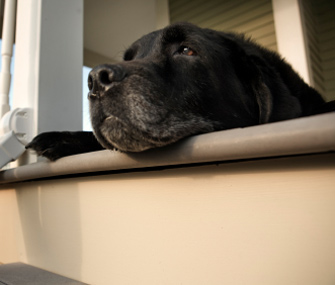Common Health Conditions in Senior Dogs
Published on May 07, 2012

As with people, certain diseases become more likely as dogs age. Kidney disease, heart disease, cancer and diabetes are among the ones that are of greatest concern.
Cancer
Cancer is a major disease of senior dogs. Warning signs depend on the cancer, but can include a new lump, sores, weight loss, lethargy, limping, breathing problems, coughing, vomiting or collapse. Treatment also depends on the type of cancer, but may include surgery, chemotherapy or radiation.
Heart Disease
Heart disease is also a major disease of older dogs. Signs can include coughing, breathing difficulty, loss of appetite, lethargy and abdominal distension. A veterinarian can diagnose the condition by listening to the heart and conducting more extensive tests such as EKG, radiographs (x-rays) or cardiac ultrasound (echocardiography). Treatment may include a special diet and medications.
Arthritis
Arthritis is very common in older dogs. Signs include limping, difficulty getting up, whining and reluctance to exercise. It can be especially evident after a day of excess exercise. Your veterinarian can prescribe drugs that can help ease the pain. Some dogs benefit from joint supplements (ask your veterinarian for the best recommendations) and lifestyle adjustments like weight management, controlled exercise and physical therapy.
Dental Problems
Dental problems are also very common in older dogs. Bad breath, bleeding gums, loose teeth, recessed gums and reluctance to chew are all signs. Your veterinarian can examine and/or radiograph your dog’s mouth, and may extract infected or painful teeth (anesthesia is required for these procedures). He may also prescribe medication for pain or infection, and at-home care to help slow down future tartar buildup.
Kidney Disease
Kidney disease is very common in older dogs. The condition may take months to years to develop, and usually doesn’t show any outward signs until the disease is fairly advanced. Signs include excessive thirst and urination, weight loss, appetite loss and vomiting. Your veterinarian can diagnose the condition with urine and blood tests, and can prescribe treatment that may include a special diet, medication and fluid injections.
Cushing’s Syndrome
Cushing’s Syndrome, or hyperadrenocorticism, occurs when the body produces too much of the hormone cortisol. This produces signs such as increased hunger, thirst and urination, as well as lethargy, muscle wasting, hair loss and a pot-bellied appearance. Your veterinarian can run urine and blood tests to diagnose it, and can then place your dog on drugs that will help him feel much better. Sometimes, surgery is recommended.
Cognitive Dysfunction
Cognitive dysfunction, somewhat similar to human Alzheimer’s disease, is seen in some older dogs. Signs include aimless wandering, loss of house-breaking and training, confusion and disorientation. Your veterinarian may be able to treat the condition with drugs.
Visual Loss
Visual loss can result from cataracts, retinal problems, brain problems or other diseases. See your veterinarian for a diagnosis.
Hypothyroidism
Hypothyroidism occurs when the thyroid glands do not produce enough thyroid hormone. Symptoms of hypothyroidism vary widely, but the most common are weight gain or obesity, hair loss or poor haircoat, rough or scaly skin, and exercise intolerance. It can be diagnosed with a blood test, and is usually well managed with medication.
Understanding Symptoms
Some of the more common symptoms and their possible causes in older dogs include:
- Diarrhea: liver disease, pancreatitis, cancer
- Coughing: heart disease, tracheal collapse, cancer
- Difficulty eating: periodontal disease, oral tumors
- Decreased appetite: kidney, liver or heart disease, pancreatitis, cancer, pain, arthritis
- Increased appetite: diabetes, Cushing’s Syndrome
- Weight loss: heart, liver or kidney disease, diabetes, cancer
- Abdominal distention: heart or liver disease, Cushing’s Syndrome, tumors
- Increased urination: diabetes, kidney disease, bladder infection or stones, Cushing’s Syndrome
- Limping: arthritis, patellar luxation, back pain, neck pain, cancer, ligament injury
- Nasal discharge: tumor, periodontal disease
Don’t just ignore a change in odors. They could indicate specific problems, such as periodontal disease, impacted anal sacs, seborrhea, ear infections or even kidney disease. Any strong or unusual odor should be checked by your veterinarian.
Vomiting and diarrhea in an old dog can signal many different problems; keep in mind that an older dog is less able to tolerate the dehydration that results from continued vomiting, diarrhea or reduced fluid intake, and you should not let it continue unchecked. The older dog should see his veterinarian at least twice a year, or more often if medically warranted. Routine screening blood tests and other diagnostics can help detect early stages of many diseases that can benefit from treatment.
The Importance of Dog Health Insurance
Dog health insurance can help you pay for unexpected health expenses, surgeries, or medications of senior dogs. It’s important to purchase insurance before there’s a problem. While pet insurance may add to your monthly expenses, it can save you hundreds or thousands of dollars in the long run.
Don’t ever let financial decisions get in the way of your dog’s care. Review personalized options for your pet below:





